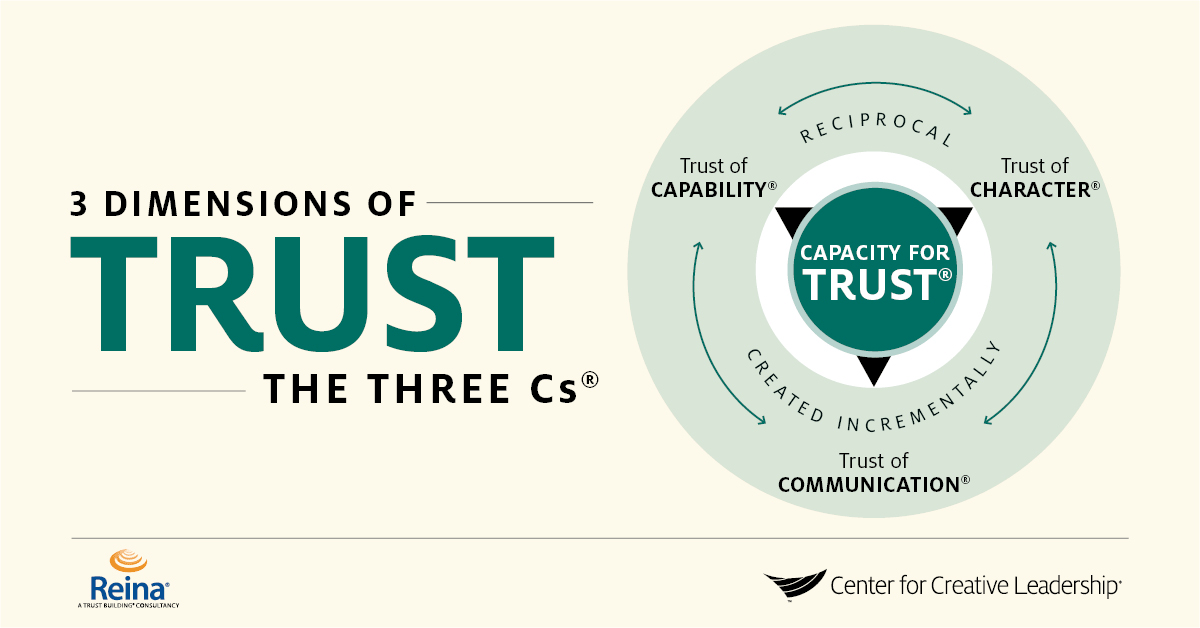Delegating Effectively Requires Building & Keeping Trust
You’ve likely encountered a situation where you’re unhappy with one of your team members. You’d like to delegate a task to them, but are hesitating.
The employee may be likable and even work hard, but the work has problems. Now, you’re wondering if they can handle an important project.
At its core, not wanting to delegate is an issue of trust. Can you trust this individual to get the job done?
Whether you’re dealing with an individual or an entire team, knowing how to build and keep trust is crucial to effective leadership.
How do you build trust in the workplace and on your team with effective delegation?
First, Know the Dimensions of Trust
Our partners, Drs. Michelle and Dennis Reina, have researched trust in the workplace for decades, and have found that trust is built, and broken, around 3 critical areas:
- Trust of Character,
- Trust of Communication, and
- Trust of Capability.
The 3 Dimensions of Trust
1. Trust of Character
Trust of Character sets the tone and direction of teamwork. This dimension of trust in the workplace represents mutually serving intentions and is the starting point of a team relationship. When teams have Trust of Character, each member has faith that the others will behave as expected.
Team members care about one another as people and hold each other’s best interest in mind. This is the foundational dimension of trust teams need to be effective. Team members build this trust when they do what they say they will do, engendering a mutual view of reliability and trust within the team.
2. Trust of Communication
Trust of Communication fuels collaboration and makes it safe for team members to talk with each other directly. This goes beyond simply providing information to one another, but also working through issues and concerns and offering different types of feedback in the spirit of deeper learning and growth.
Through Trust of Communication, teams practice transparency — they communicate openly and honestly. Members feel safe to admit mistakes and know where they stand with one another. Trust of Communication creates an environment of collaboration that teams need to thrive.
3. Trust of Capability
Trust of Capability opens the door for team members to contribute and to use their knowledge to make a difference. Members build this type of trust in the workplace by leveraging the skills and abilities of one another, seeking each other’s input, engaging in decision making, and teaching one another new skills. Trust of Capability helps create a culture of innovation and allows teams and organizations to be competitive.
Together, these 3 dimensions of trust help teams understand the behaviors needed to build and sustain trust in the workplace.
Then, Talk About the Trust Issue
Once you understand the dimensions of the problem, it’s easier to have an honest conversation with a team member or colleague. Here are some phrases that help start the conversation out in a productive way:
- “I’d like to talk about something that’s concerning me.”
- “May we talk about your work on the project?”
- “I need to explore with you where we are on the project.”
It’s important to address problem employee behaviors in a way that shows the employee genuine support — demonstrating your loyalty. Then, you can discuss a solution to the problem, such as pairing the worker up with a more experienced team member. Finally, make sure you are delegating workloads effectively and set up a method for creating accountability.
Some Final Thoughts on Building Trust in the Workplace & Your Team
Honest, open discussions about trust set the stage for deeper, more productive conversations about team performance and create stronger bonds between leaders and employees.
These steps are essential to building trust in the workplace, and with your team.
Ready to Take the Next Step?
Upskill your people’s ability to build trust in the workplace through delegating effectively with a customized learning journey for your leaders using our research-backed modules. Available leadership topics include Conflict Resolution, Communication, Delegating Effectively, Listening to Understand, Psychological Safety & Trust, and more.










